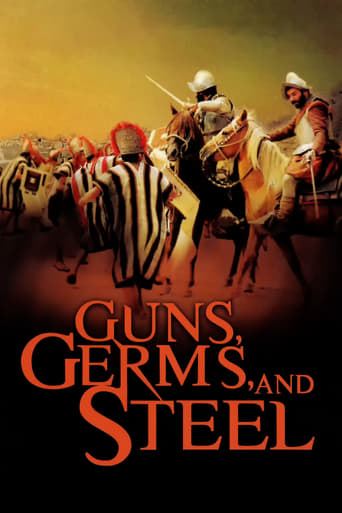

Too much of everything
... View MoreInstead, you get a movie that's enjoyable enough, but leaves you feeling like it could have been much, much more.
... View Morea film so unique, intoxicating and bizarre that it not only demands another viewing, but is also forgivable as a satirical comedy where the jokes eventually take the back seat.
... View MoreThe film's masterful storytelling did its job. The message was clear. No need to overdo.
... View MoreQuite a few reviewers are being far too harsh and expecting this to be something else that they watched. This does a good job of answering the question presented in regards to who asked the question, someone from New Guinea. It explains the limiting factors that keep a population from being able to free up enough of their individuals in order to allow them to focus on objectives not to do with getting food. There are more answers to the question if you change who asks it but in pertaining to the people that asked the question it does a good job of covering the basics of some of the bases.Yes, there are scenes of him failing at using some tools. It seemed to me like a demonstration that westernization means nothing to ability and intelligence.I would suggest showing this to just about anyone. While it doesn't cover all of the bases it puts the information it does cover in an easily understandable format and explains factors as simply as possible.
... View MoreJared Diamond is a professor in UCLA specializing in biology. He endeavors to explain why world history unfolded as it did. Why did certain groups dominate while others ended up so far behind? He starts with a journey to Papa New Guinea. His theory is generally that everybody is the same but certain locations allow for better opportunities. Eurasia had the better crops and animals for domestication. Domestication also allow for germs to develop. Also the east west travel within common climate allowed an easier trade route which advanced technologies even further. And geography explains why China and other monolithic middle east empires stagnated whereas Europe's geography favors a bulkanized map and tougher competitions from close neighbors.In general terms, I have no big problems with his theory. It doesn't add a whole lot to understanding the world. He's not discover something new as much as reorganizing what everybody already knows. There are ideas and concepts that are ignored too easily. There is a lot of generalization but that's the theory. It's trying to generalize the whole of human history with a few simple ideas. The theory is noteworthy for what's not in it as much as what's in it. It's just that I wish there is some definitive mathematical evidence to verify his theory. Also world history has a tendency to be more muddy than what's presented here.
... View MoreThis film is an attempt to present Jared Diamonds theory of "Guns, Germs and Steel", explaining how Europeans have dominated much of the globe.The version I saw of this documentary came on 2 discs covering 3 hours. I think the information could have been presented in 20 minutes. There are completely useless scenes of: Professor Jared Diamond watching birds through binoculars, Professor Jared Diamond failing to use a bow and arrow properly, Professor Jared Diamond firing a muzzle-loader badly. Was this documentary supposed to make a hero out of "Professor Jared diamond?". This part of the documentary was so bad, it could have been a spoof. The worst was when Diamond is shown breaking down and weeping when touring the malaria ward in an African hospital. None of this helps me understand his theory of "Guns, Germs and Steel." BTW, "Guns, Germs and Steel" is said about 100 times. "Can the Europeans guns, germs and steel get them out of this dire situation? Stay tuned and find out!" When he finally gets down to business, his theory is equal parts interesting and utterly boring. Europeans conquered the natives peoples of other lands, because they had guns and fine blades against stone and wooden weapons. Do I really need a professor to convince me of this? The parts of his theory that explain how the Europeans came to have the advantages that allow the conquest are interesting, but the coverage is paper-thin.In the end, I think the documentary was only trying to convince me that non-Europeans are as capable as Europeans. If I'm not a racist, I already know this. If I'm a racist, Jared Diamond is not going to convince me with his bumbling use of native implements.I don't think adults are the intended audience for this documentary. Kids may enjoy this more than I, though. I have read that the book from which this documentary is much better than the documentary.
... View MoreJared Diamond made a point in the first episode that other peoples of the world didn't have animals to domesticate but Europeans did, and that accounts for why we were able to make steel and invent complex machines.But then in the third episode he says that when the Europeans in South Africa got too far north they ran into Zulu people and other tribes that *herded cattle and planted crops*. So what explains their lack of technological, economic, and artistic achievement if they had the key things the author claims are needed for success?Diamond also claims germs in the form of smallpox (brought to North America by black slaves) were our biggest weapon. Well, if 150 Europeans can defeat 20,000 native warriors and 400 non-military South Africans can defeat 10,000 Zulus *without a single casualty* in either case, then I think you have to conclude that germs are irrelevant. With or without germs, we were going to succeed.He says Malaria stopped Europeans from colonizing further North, killing "thousands" of Europeans while not affecting Africans. (I'd like to know real numbers but he doesn't say.) Then at the end he says today Malaria is killing thousands of Africans and that is why they can't catch up with us. So which is it, Jared? Did Malaria help the Africans by halting Eurpeans or hurt them? And how come Europe did okay despite massive plagues throughout our history? He also seems far too eager to say that the reasons Europeans succeeded was because of dumb luck. At times when the evidence threatens to overwhelm his rickety theories he's reluctant to admit that maybe Europeans were successful because they worked for it. It's sad watch this obvious neo-Marxist contort reality to try to prove his point.
... View More